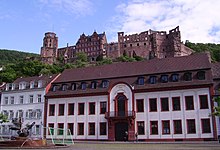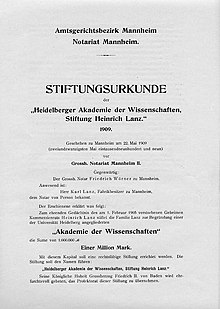Heidelberg Academy of Sciences
| Heidelberg Academy of Sciences | |
|---|---|

|
|
| founding | 1909 |
| Sponsorship | KdöR |
| place | Heidelberg , Germany |
| president | Thomas Holstein |
| Website | www.hadw-bw.de |
The Heidelberg Academy of Sciences ( HAdW ) is the State Academy of Sciences of Baden-Württemberg . It is a learned society steeped in tradition, whose members - according to the statutes - must have proven themselves through "excellent scientific achievements" in their subject before being elected as a member. As a non-university research institution, the Academy operates projects in the field of basic research in the humanities in cooperation with the universities of the State of Baden-Württemberg and other important research institutions . With the WIN-Kolleg established in 2002 and the awarding of several research prizes, the academy promotes young scientists.
history
The academy was founded in 1909 by a foundation from the industrialist Heinrich Lanz as a grand ducal academy of Baden . This establishment saw itself as a re-establishment of the Palatinate Academy Mannheim, which was founded in 1763 but already expired in 1803 .
Since 1920 the academy has been located in the former Grand Ducal Palace directly below Heidelberg Castle . It has been the State Academy of Baden-Württemberg since 1958 and an independent body under public law since 1966 . Your meeting reports are among the most important series in the humanities . Paul Kirchhof was President from 2013 to March 31, 2015 . Thomas Holstein has been President since April 1, 2015, and Bernd Schneidmüller will succeed him on October 1, 2020 . The Heidelberg Academy of Sciences is a member of the Union of German Academies of Sciences .
research
The academy is currently running 19 research projects with more than 200 employees, primarily in the field of basic research in the humanities. These include several internationally renowned dictionary projects such as the German legal dictionary (DRW) and the Goethe dictionary and a special focus on text editions from the time of humanism and the Reformation , including the Luther register - which was successfully completed in 2009 and thus from the Academy program - and the editions of works by Martin Bucer (successfully completed in 2016) and Philipp Melanchthon as well as the project Theologians' Letters in the Southwest of the Empire in the Early Modern Period (1550–1620), which was added in 2017. There are also critical editions by important philosophers, such as the Nietzsche Commentary and the Karl Jaspers Complete Edition. The academy also oversees research projects whose research field is located around the world, such as B. The Role of Culture in Early Expansions of Humans , "Buddhist stone inscriptions in North China", "Edition of literary cuneiform texts from Assur", " Heidelberg Epigraphic Database " or "The Temple as a canon of Egyptian religious literature".
Prices
The Heidelberg Academy of Sciences awards annually:
- Academy award; Rotation alternating natural and human sciences; Endowment: 6,000 euros; Target group: young German researchers under 40
- Ecology Prize from the Sigrid and Viktor Dulger Foundation (formerly Sigrid and Viktor Dulger Prize); Endowment: 6,000 euros; Target group: since 2013 for scientific work in the humanities, social sciences, natural sciences and engineering that deal with environmental problems and their solutions; Donated by the Sigrid and Viktor Dulger Foundation
- Karl Freudenberg Prize; Endowment: 6,000 euros; Target group: young scientists from Baden-Württemberg, preferably the subjects of biology and chemistry; The founder is the Freudenberg Group
- Walter Witzenmann Prize ; Endowment: 6,000 euros; Target group: young German scholars from the field of cultural studies; named after the founder Walter Witzenmann
- Manfred Fuchs Prize; Endowment: 10,000 euros; Target group: Awarded since 2015 to qualified young researchers who are doing their habilitation in the humanities within the framework of the Heidelberg Academy's WIN program or who are working as head of research in the natural and engineering sciences and who are generally preparing for a professorship; named after the founder Manfred Fuchs .
- Otto Schmeil Prize (usually awarded every two years); Endowment 15,000 euros; Target group: young German researchers up to 40 years of age; for outstanding work in the field of biology or the basics of medicine; donated by the Schmeil Foundation .
- Reuchlin Prize (usually awarded every two years); Endowment: 10,000 euros; Target group: since 1955 as an honor for excellent German-language work in the field of humanities; named after Johannes Reuchlin; donated by the city of Pforzheim.
- Karl Jaspers Prize (usually awarded every 3 years); Endowment: 25,000 euros; Target group: Awarded since 1983 for a scientific work of international standing that is carried by a philosophical spirit. The scientific meaning should cross the boundaries of a humanities or psychiatric discipline in favor of an interdisciplinary understanding; named after Karl Jaspers; Donated by the City of Heidelberg, the University of Heidelberg and the Heidelberg Academy of Sciences.
See also
literature
- Udo Wennemuth: Science organization and science funding in Baden. The Heidelberg Academy of Sciences 1909–1949 Winter, Heidelberg 1994. (Heidelberg Academy of Sciences / Philosophical-Historical Class: [Meeting reports of the Heidelberg Academy of Sciences, Philosophical-Historical Class / Supplements] 8) . ISBN 3-8253-0138-9
- Udo Wennemuth: Heidelberg Academy of Sciences. In: Christoph J. Scriba (Ed.), The Elite of the Nation in the Third Reich. The relationship of academies and their scientific environment to National Socialism. ( Acta historica Leopoldina 22). Halle / Saale 1995, pp. 113-132.
-
Volker Sellin , Sebastian Zwies (Ed.): 100 Years of the Heidelberg Academy of Sciences. Winter, Heidelberg 2009.
- Volume 1: The Heidelberg Academy of Sciences as reflected in its inaugural speeches 1944–2008. With a list of their full members 1909–2008. ISBN 978-3-8253-5568-5
- Volume 2: The research projects of the Heidelberg Academy of Sciences 1909–2009. ISBN 978-3-8253-5569-2
Web links
- Heidelberg Academy of Sciences
- Mathematical work of the Heidelberg Academy of Sciences in the collection of Heidelberg texts on the history of mathematics , in particular the overview of mathematics in the Heidelberg Academy of Sciences
Individual evidence
- ↑ https://www.hadw-bw.de/die-akademie/geschichte-der-akademie
- ^ History of the Academy | Heidelberg Academy of Sciences. Retrieved March 26, 2018 .
- ↑ Uta Hüttig: Heidelberg Academy of Sciences elects Bernd Schneidmüller as the new president. Heidelberg Academy of Sciences, press release from August 3, 2020 from the Science Information Service (idw-online.de), accessed on August 3, 2020.

